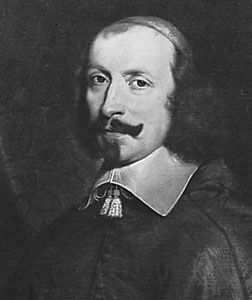Jules, Cardinal Mazarin
- Original Italian in full:
- Giulio Raimondo Mazzarino, orMazarini
- Born:
- July 14, 1602, Pescina, Abruzzi, Kingdom of Naples [now in Italy]
Jules, Cardinal Mazarin (born July 14, 1602, Pescina, Abruzzi, Kingdom of Naples [now in Italy]—died March 9, 1661, Vincennes, France) was the first minister of France after Cardinal de Richelieu’s death in 1642. During the early years of King Louis XIV, he completed Richelieu’s work of establishing France’s supremacy among the European powers and crippling the opposition to the power of the monarchy at home.
Service as papal diplomat.
Born a papal subject at Pescina, in the Abruzzi, near Rome, Giulio Mazzarino spent his childhood in a region whose temperament, ways of thought, and Roman Catholic outlook were to permeate his whole existence. His father, Pietro, was a Romanized Sicilian in the household of the constable Filippo I Colonna; his mother, Ortensia Bufalini, of a noble Tuscan family, was related to the Colonna house by marriage. From the beginning Mazzarino recognized the benefits of having powerful patrons and learned to exploit them to his advantage. Thus, in spite of financial difficulties and the expenses of a large family (another son, who became a monk, and four daughters), the Mazzarinos were able to send Giulio to the Jesuit school in Rome, where he was an excellent student.
Accompanying a young member of the Colonna family to Spain, he completed his education at the university at Alcalá de Henares (now the University of Madrid), where he studied law and then returned to Rome eager to learn more about aristocratic ways of life and secular affairs. From the Colonna he obtained a captaincy in the papal army in 1624, and, while serving in Loreto, on Christmas night 1625 he underwent an unusual mystical religious experience, or “tranquility of soul,” which was to exert a certain influence on his life. He entered the diplomatic service of the Holy See and in 1628 was appointed secretary to the papal legate of Milan, G.F. Sacchetti; in this post he had his first opportunity to play an active political role.
In January 1630, during the war between Spain and France over the succession to the crown of Mantua, Sachetti’s successor, Antonio Cardinal Barberini, sent Mazarin to France to negotiate with the great cardinal de Richelieu. The young man was fascinated by the powerful minister: “I resolved,” he wrote, “to devote myself to him entirely.” Soon afterward the young secretary acquired an international reputation when he dramatically galloped between the two opposing armies about to do battle at Casale in Monferrato on Oct. 26, 1630, shouting “Peace, peace!” as if peace had been concluded. For the rest of his life he would be remembered as the intrepid knight who risked his life between two armies in order to stop the fighting. Though the Spaniards raised their siege at Casale, much remained to be done in order to bring about a general settlement. By the Treaty of Cherasco (June 19, 1631), negotiated by Mazarin, the French candidate was installed in Mantua, but the agreement settled only the differences between France and Savoy.
Mazarin’s resolution to devote himself to Richelieu did not prevent him from also obtaining the patronage of Cardinal Barberini, the youngest nephew of Pope Urban VIII. After Mazarin’s return to Rome in 1632, Barberini included him in a circle of artists, painters, and musicians, before obtaining for him a mission as extraordinary nuncio (ambassador) to the French court in 1634. There, at Richelieu’s side, Mazarin acquired the favour of those in power and became devoted to the French nation, whose “openness of heart and of mind” impressed him. He did not forget his mission, however, which was to negotiate the peace between Spain and France sought by Urban VIII; hence it was with despair that he watched Richelieu bring France openly into the Thirty Years’ War in May 1635.
Recalled to Avignon in his capacity as legate, then to Rome (December 1636), he continued to exert an influence on French politics through his correspondence with Richelieu and his adviser, Father Joseph. With his friends cardinals Barberini, Nicholas Bagni, and Alessandro Bichi, Mazarin directed the French faction within the papal court. Louis XIII of France rewarded his efforts by recommending him as the royal candidate for a cardinalate in 1638, gave him ecclesiastical pensions and benefices (in order to be eligible for them Mazarin was granted French naturalization papers in 1639), and finally invited him to return to Paris, where he arrived on Jan. 5, 1640. Disappointed because his ambitions in Rome had been frustrated by the Spanish faction, Mazarin left the papal service to enter the service of France. It was to France and, in particular, to Richelieu that he owed the cardinal’s hat bestowed upon him by the Pope on Dec. 16, 1641, though Urban VIII had himself been favourably impressed by the efforts his former subject was making in favour of the general peace.
















